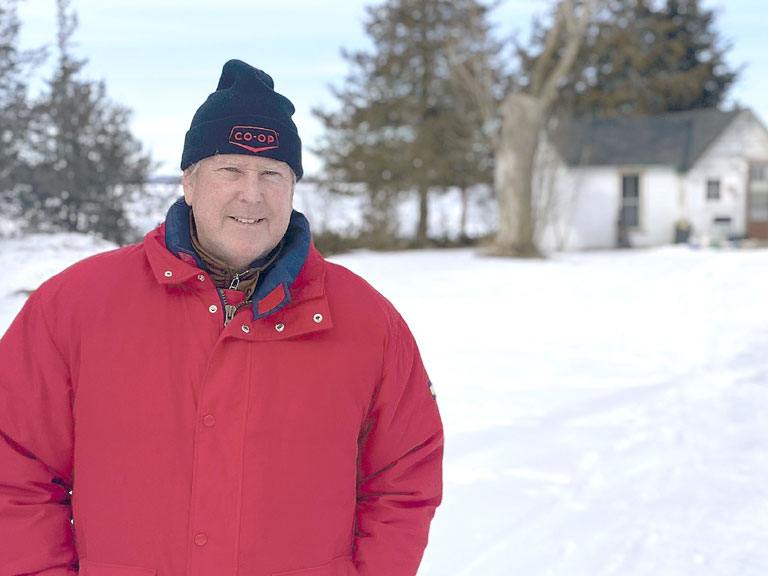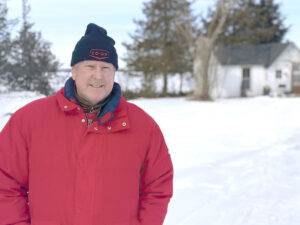County News
Carbon farming

Kate’s Rest embarks upon climate emergency initiative
Learning about carbon farming and why it could play an important role in Prince Edward County’s future was the topic of a deputation presented to the Community and Economic Development Commission last Monday. In a detailed presentation, Brian Hart of Kate’s Rest located on Big Island in Prince Edward County, said they wanted to be leaders in a carbon farming initiative in the County, one he described as a “newly emerging circular economy”. Hart was joined by collaborative partners Fedaa Khirallah of Advancing New Canadian Women in Technology, which is affiliated with Ottawa University, and Charles Mignault, Director of Smith Business Consulting, and adjunct professor at Queen’s University.
Kate’s Rest is a community comprising of women, men and children who were homeless, or were in immediate danger of facing homelessness. Hart explained how in 2019 and 2020 Kate’s Rest was studied by two universities. “Their findings recognized our community’s unique and valued contribution to addressing rural homelessness,” said Hart. “Now, having established our own home, we wish to take our place in the broader community by providing leadership in response to the declaration of climate emergency made by council in May 2019.” Kate’s Rest hopes to play a part in addressing Prince Edward County’s climate emergency declaration to significantly reduce the amount of greenhouse gases, something Hart believes can be achieved with their carbon farming initiative. “Unparalleled quantities of greenhouse gases are in our atmosphere and are unleashing devastation,” he said.
Hart spoke to the aquaponic farm pilot project Kate’s Rest embarked upon a few years ago when they received a small grant to pay for an online course in designing, building and operating an aquaponic farm. In 2019, the residents were able to design, build and operate a small pilot farm. “Aquaponics is the centre pole of the carbon farming tent, as well as a reliable source of local food supplies all year round,” he said. Hart explained how their first pilot crop was chosen to help address the military’s need to reduce its carbon footprint. Under the direction of the Royal Military College in Kingston, they were commissioned to grow 2,000 hybrid poplar trees for planting on 8 Wing CFB Trenton. “We were well on our way when the pandemic hit and as a result access to the base was necessarily restricted.”

Brian Hart at Kate’s Rest during a tour of the property last winter.
The aquaponic farm they built was based on an ancient farming technique that uses water most efficiently and which mimics the local ecosystem’s interdependence of life. “Plants are grown on floating rafts in water troughs and fed nutrients from fish effluent provided by an interconnected fish tank,” explained Hart. “Before entering the grow beds, the fish effluent is broken down by beneficial bacteria in the water. This is necessary so the plants’ roots may draw out the nutrients from the water so as to make it clean enough to return to the fish tank.” Being climate controlled, the aquaponic farm can grow food all year round and in any weather, where Hart notes it can be a key contributor to addressing the County’s food insecurity issue, as well as for other things, such as tree growing. For the growing of tree seedlings via an aquaponic farming system, Hart explains the trees would be then transplanted on marginal land that has not been used for decades due to the poor soil conditions. “Permaculture and polyculture farming practices will be employed on the tree plantations so as to optimize the capture of carbon and to promote habitats for local lands and aquatic fauna and flora.” He said these tree plantations would provide an additional source of revenue for County farmers as they use their marginal lands to capture carbon and enrich their soils. Integrated in the design of the aquaponic farm is a pyrolizer, which is essentially an airless oven that cooks biomass such as clean waste wood, crop residue, such as grape skins, and wood chips from trees. The biomass is then cooked in the airless oven and charcoal is the result with no greenhouse gas emissions.
“From this processing of biomass, both heat and electricity are byproducts, which are used as an energy source for the farm and farm vehicles,” he said. “Our end product is charcoal, which is essentially carbon.” He explained how with the charcoal they will produce, the atmospheric carbon that has been removed by the trees and other plants, is then returned to the geosphere as a soil amendment. “What came from the earth and entered our atmosphere is now returned to the earth permanently.” Before being added to the soil, the charcoal would be treated with an organic liquid mixture of beneficial bacteria and fungi spores. “In this way, much-needed natural nutrients are added to the soil along with organisms that will help crop roots absorb those nutrients.” He said the result of treating soil in this way is both a greater field crop production and quantifiable amounts of carbon that is locked away in the earth for centuries. “These quantities of banked carbon may then be exchanged as marketable carbon credits or offsets quantified in metric tonnes of carbon.” Hart said these local credits can be sold to local industry, businesses, individuals and the military in order that they may meet their objectives of reducing their carbon footprint.
“We are very much interested in this process of drawing down the carbon from the atmosphere through photosynthesis and burying it in the geosphere as a soil amendment as this form of practice utilizes and enhances natural process,” Khirallah said. Mignault’s involvement comes in the form a fourth year commerce class he teaches that will see five students from the Smith School of Business work on a comprehensive project for Kate’s Rest beginning in September. “I am inspired by the work being done at Kate’s Rest and around environmental sustainability and economic development,” said Mignault.
Hart’s request to the Commission was for a staff report on the feasibility of a people’s assembly to deliberate and make recommendations on the implementation of the carbon farming initiative in Prince Edward County. Hart is looking to bring stakeholders on board to at least get a discussion going through an informal working group that would include farmers, business people, industries, etc., making up “the full gamut of those different sectors of our economy that would have something to gain in participating in this project.” He would like to see a people’s assembly in place for the fall, with recommendations coming early in the New Year. “What we are looking for at the moment is not so much in the form of money as the will of the community at large to become aware and engaged in this initiative, to educate themselves about the importance of it.” The deputation can be viewed on the County’s YouTube channel.

Comments (0)